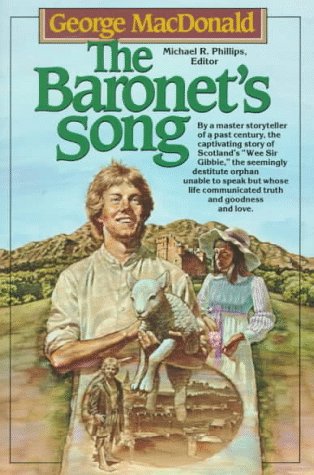 We've started another wonderful George MacDonald book and the children beg for "just one more chapter". We're reading an edition edited by Michael Phillips, titled, The Baronet's Song, produced by Bethany House Publishers. This book was originally published as Sir Gibbie. It's a beautiful story and as usual MacDonald's words are often worth recording and find their way into my commonplace book. Here is a memorable quote: "So, teaching him only that which she loved, not that which she had been taught, Janet read to Gibbie of Jesus, and talked to him of Jesus, until at length his whole soul was full of the Man, of His doings, of His words, of His thoughts, of His life. Almost before he knew, he was trying to fashion his life after that of the Master.
We've started another wonderful George MacDonald book and the children beg for "just one more chapter". We're reading an edition edited by Michael Phillips, titled, The Baronet's Song, produced by Bethany House Publishers. This book was originally published as Sir Gibbie. It's a beautiful story and as usual MacDonald's words are often worth recording and find their way into my commonplace book. Here is a memorable quote: "So, teaching him only that which she loved, not that which she had been taught, Janet read to Gibbie of Jesus, and talked to him of Jesus, until at length his whole soul was full of the Man, of His doings, of His words, of His thoughts, of His life. Almost before he knew, he was trying to fashion his life after that of the Master. "Janet had no inclination to trouble her own head, or Gibbie's heart, with what men call the plan of salvation. It was enough to her to find that he followed her Master."
This reminded me of a quote by Charlotte Mason from Home Education, "The Essence of Christianity is Loyalty to a Person--Christ, our King. Here is a thought to unseal the fountains of love and loyalty, the treasures of faith and imagination, bound up in the child. The very essence of Christianity is personal loyalty, passionate loyalty to our adorable Chief. We have laid other foundations--regeneration, sacraments, justification, works, faith, te Bible--any of which, however necessary to salvation in its due place and proportion, may become a religion about Christ and without Christ. And now a time of sifting has come upon us, and thoughtful people decline to know anything about our religious systems, they write down all our orthodox beliefs as things not knowable. Perhaps this may be because, in thinking much of our salvation, we have put out of sight our King... Let us save Christianity for our children by bringing them into allegiance to Christ the King. How? How did the old Cavaliers bring up sons and daughters, in passionate loyalty and reverence for not too worthy princes? Their own hearts were full of it; their lips spake it; their acts proclaimed it; their style of clothes, all was one proclamation of the boundless devotion to their king and his cause. That civil war, whatever else it did, or missed doing, left a parable for Christian people. If a Stuart prince could command such measure of loyalty, what shall we say of the Chief amongst ten thousand, the altogether lovely?'"
